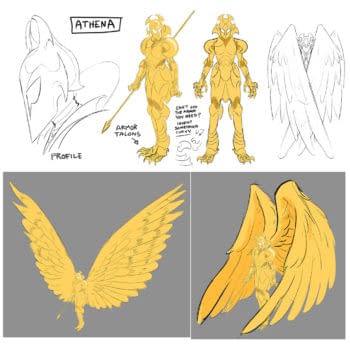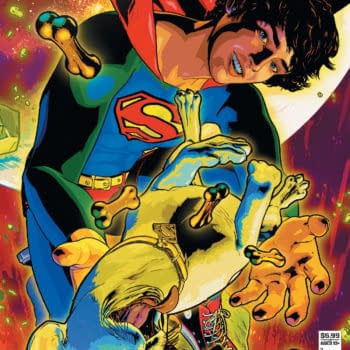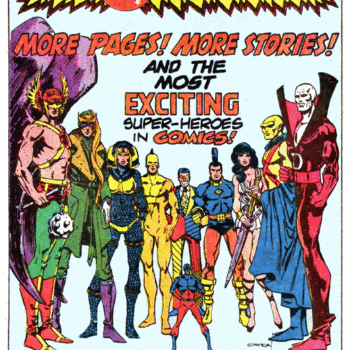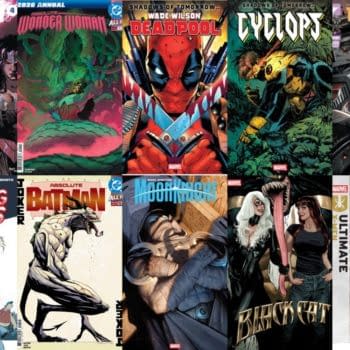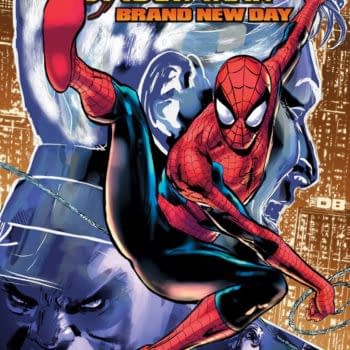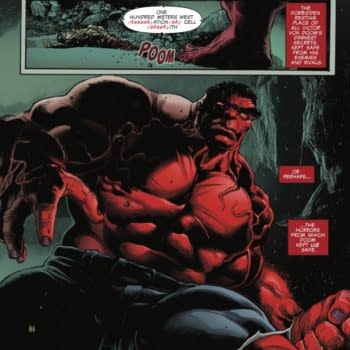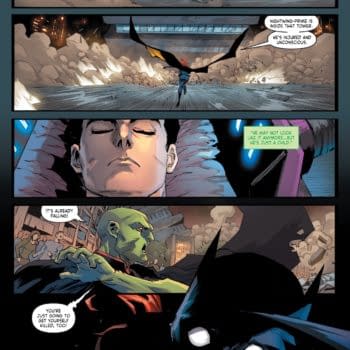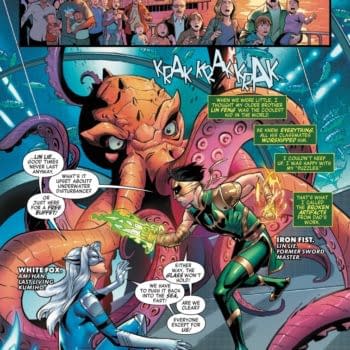Posted in: Comics, Current News | Tagged: canada, graphic novel, Robert Plante, Rocking Spurs
Rocking Spurs Graphic Novel Causes Canadian Racial Identity Uproar
Rocking Spurs: The Anti-Bullying Tour, is a graphic novel adaptation of the novel Rocking Ten by KD Beckett, and is drawn by Robert Plante
Article Summary
- Graphic novel 'Rocking Spurs' ignites debate on Métis identity in Canada.
- Métis leadership condemns portrayal of Eastern Métis in recent publication.
- Dalhousie University seminar leads to creation of controversial graphic novel.
- Questions arise over Métis representation and educational material in schools.
Rocking Spurs: The Anti-Bullying Tour, is a graphic novel adaptation of the novel Rocking Ten by author KD Beckett, and drawn by Robert Plante. Intended to investigate Indigenous identity in Canada, nearly 1,500 copies have been sent to schools across the country for educational purposes. But the book has drawn outrage from Métis leadership and from Métis groups, who say the book undermines their history and represents an attack on their sovereignty.
The Métis are an Indigenous people whose historical homelands include Canada's three Prairie Provinces, as well as parts of British Columbia, the Northwest Territories, Northwest Ontario and the northern United States. They have a shared history and culture, deriving from specific mixed French, Scottish, English and Indigenous ancestry, which became distinct by the mid-18th century, during the early years of the fur trade. The Métis, with a population of 624,220 as of 2021, are one of three major groups of Indigenous peoples recognized by the Canadian government alongside First Nations and Inuit, have a distinct culture and history, as well as their own language, Michif.
Rocking Spurs: The Anti-Bullying Tour is the result of a third-year history seminar at Dalhousie University, in Halifax, Nova Scotia, led by Dr Lisa Binkley, an assistant professor of history. The novel was gifted to the class by KD Beckett, the pen name of Karole Dumont, the Chief of the Métis Nation of Canada, a group that isn't recognized by the Canadian federal government. who donated all author rights and copyright to produce the graphic novel to the group. Rocking Spurs: The Anti-Bullying Tour is now officially published by the MNC.
What's the graphic novel Rocking Spurs about?
The book's main characters are Kaylani Simon, a young Innu-French woman from Québec, who is bullied over her Eastern Métis identity, her small daughter Rosie and their encounter with Cayden Sheppard and his country-rock band called the Rocking Spurs. The band learns that this woman has been severely bullied on social media and faces racism on a regular basis, so the band members use their fame and wealth to expose the persecutors that have been bullying this woman and other Indigenous people.
How did Rocking Spurs come about?
In 2023, Dr. Lisa Binkley taught a third-year seminar on Métis Histories and Culture, exploring the emergence of the Métis people in Canada from the mid-1600s in the East, the migration through Quebec and Ontario in the 1700s, and the rise of the Western Métis in the 1800s. As various Métis communities across Canada reclaimed ancestral knowledge and searched for recognition, the seminar explored the politicization of Métis and non-status Indigenous identities in Canada. Students were exposed to the broad literature, laws, and events involving the Métis in Canada that inform what is known about this Indigenous group in Canada. As part of the course curriculum, students adapted Métis author K. D. Beckett's Rocking Ten by creating a script for the graphic illustrations by Robert Plante.
Each week, students brought together the course curriculum that included peer-reviewed research from North American scholars with the events unfolding in the novel and real-time in the media to discuss how differences of opinion, background, history, and knowledge all contribute to misunderstanding, ignorance, and then violence through bullying in its many forms.
Dalhousie University says "A group of Dalhousie students earned credit for a history course they took last year and another kind of credit, too, as collaborators on a graphic novel that will soon land in the hands of high school students across Canada. Rocking Spurs: The Anti-Bullying Tour was created by students in a third-year seminar on Métis Histories and Culture taught by Dr. Lisa Binkley, an assistant professor in the Department of History. Dr. Binkley challenged the students to take what they were learning in the course about Métis identities, literature, laws, and events and integrate it into an adaptation of the novel, and recently organized a gathering to celebrate the graphic novel's launch."
Student Hannah S. Beaulieu, doing a master's degree, stated, "I am also Métis and both my undergrad and graduate theses are about Métis history, and the course was on Métis history, so in a way I felt very immersed into the Métis culture landscape… I think having that insight really helped develop the underlying messages that we wanted to convey in the graphic novel, such as resilience and reconciliation, and community and family and all these things that really brought together the characters in the storyline."
Funding from the Social Sciences and Humanities Research Council (SSHRC) New Frontiers in Research Fund (NFRF) and the Canadian Race Relations Foundation (CRRF) supported the project and enabled the class to hire the artist Robert Plante to illustrate and oversee the art work of the graphic novel. Now, 1,500 copies are bound for libraries in high schools across the country and will also be available for purchase locally.
Where does the controversy emerge?
Métis people in the Canadian prairies have long asserted the term can't simply be used to define anyone with mixed ancestry and that only the descendants of the Red River Métis should be constitutionally recognized as Métis people, as they developed a distinct culture as a people historically, and have continued to exist as a distinct culture and community over many generations.
Objections to this standard have been made to the Métis National Council, by both individuals and newly formed groups who do not meet the established citizenship criteria, largely in the Maritime, Quebec, and Ontario regions, including New Brunswick and Nova Scotia, and are referred to as "Eastern Metis" and assert that having a single, distant, Indigenous or possibly Indigenous ancestor should be enough to be considered Métis and should not have to meet the resident requirement as defined by the federally recognized Métis organizations.
But other groups have challenged that definition, and a growing number of people have started identifying as Métis , especially in regions of Canada like New Brunswick, Nova Scotia and Quebec, where the group doesn't have a homeland or deep historic ties. Those groups are referred to as Eastern Métis, and their status as Métis is strongly disputed by those in the west.
The graphic novel stated that "Some people deny the existence of the Métis people from Nova Scotia to eastern Ontario. They claim that anyone identifying as Eastern Métis is a race shifter and doing it for benefits, tax evasion and money. They claim we're cheating First Nations of their lands and treaty rights."
Lisa Binkley said she wanted to help students understand the current arguments around Métis identity in Canada and that students in the seminar were exposed to "scholarship, laws, oral histories and the constitution" in order to better understand the complexity of the debate. "A lot of people only hear one side. These students are curious and they just want to know more about who they are. There's so much fear around ideas of 'pretendians' and discussions around race-shifting. We thought that if you take this idea of the word 'Méttis' out of it, you realize there are a lot of people still in Canada that are of mixed descent, and that are just interested in understanding and engaging with that culture."
David Chartrand, president of the Manitoba Métis Federation (MMF) however states in the Guardian, "this attempt to make it look like we're bunch of mixed bloods – that you can have an ancestor going back several hundred years and that you can claim you're Métis – that is so, so far from what being Métis is. They've created a fantasy. But we've fought battles for our people, our nation and for our identity. We're not going to give it up now, because a group has decided there are benefits to calling themselves Métis." He told APTN, "To state that the Métis of Red River migrated eastern Canada from Nova Scotia, that we migrate over there and we found our way to the Prairies is absolutely absurd. It's insulting. It's damaging and it will truly hurt a lot of people."
And Cassidy Caron, president of the Métis National Council (MNC), told APTN "There is no such thing as Eastern Métis communities. Our communities come from the historic northwest, there is no such thing as a Métis Innu community and we stand firm against this fight against the Eastern Métis. We don't support the book we don't support the work that the Metis Nation of Canada is doing and we will never condone this."
David Chartrand continued "I used to believe and trust in the university, the brand Dalhousie. You're supposed to trust the professors that they are going to bring legitimate legal real true stories to you that you can have the chance to reflect, debate, review and do research if necessary but by bring you fantasy and fakes and misleading misguiding you is trapping you… This also draws the question to Dalhousie, how serious is your procurement of your policy on the promise of ensuring us as Indigenous leaders, Indigenous Nations as the Red River Metis of the west, how secure is your polices to ensure that you are not going to allow this to happen again."
So what happens now?
Cassidy Caron said she wants all copies of Rocking Spurs recalled. "It should be our Métis governments who are telling these stories it should not be these false Indigenous bodies who claim to represent Métis and continued to spread this misinformation. We will be taking action and reaching out to the and reaching out to the school boards that have accepted these books… It was concerning to see that SSHRC was involved in funding this and we will also be reaching out to SSHRC to strengthen that relationship and help them to understand that you know the harm that they do as an institution to fund this ongoing misinformation campaign is harmful to our self determination and our sovereignty as Indigenous people."
The MMF and the MNC previously have publicly sparred over the Métis issues, but have united in their opposition to this graphic novel.








